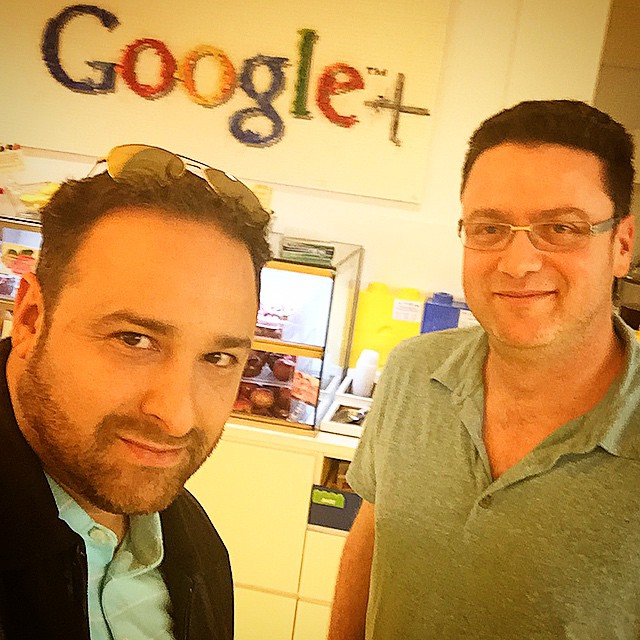A few weeks ago, I was fortunate enough to visit an old friend at Google, NY. Now why is that interesting? Because I call Tomer “An old friend” despite the fact that I had never met him. “Wow, you have a strange definition of friend” is probably what you’re thinking. Could very well be, but if you think about the nature of friendship, you will quickly realize that a friend is someone you learn from, someone you share experiences with, and someone you respect and, well, like. Such is Tomer.
I have been following Tomer for years on the social web and consistently learning new and interesting things from his expertise. So when I found out that I was gong to be visiting NYC, it was clear to me that we would need to meet up. And so we did. At Google, NY. Below is the interview I conducted with Tomer, both in text and video.
Enjoy!

1: Who is Tomer Sharon? Give me your background.
I preach and teach user research at Treehouse and General Assembly and hold a master’s degree in Human Factors in Information Design from Bentley University in Waltham, MA. I am @tsharon on Twitter. I relocated from Israel to the US in 2007 and I am a loving husband to Iris and proud father to Segev, Sella, and Alma.
2: What is a UX Researcher and why is it important for a company and that company’s customers?
A UX Researcher is someone who is providing insights into product users, their perspectives, and abilities to the right people at the right time. A UX Researcher helps strategize, execute, and assess products before, during, and after development, respectively.
A researcher helps answer three types of questions: What do people need? What do people want? (often very different than what they need), and Can people use the thing?
If a company want to jump on the UX bandwagon, then research is a key aspect of it. If organizations wish to avoid developing beautiful, usable products nobody needs, research is important.
For customers, research is key because it helps making sure products are useful and usable.
Although some UX people think their role is THE most important, great products come from great collaboration between Engineering, Marketing, Product Management, and other disciplines that are as important as UX.
3: Three rules that make good UX, and today with the prevalence of smartphones, a focus on mobile UX is key:
- Be humble: what you “know” to be true is not necessarily so. UX research is there to help you get to the truth about users and what they need. You are not the user (nor are your mother, father, siblings, friends, and colleagues) so never say, “I as a user think that…”. These are faith-based hallucinations.
- Never stop educating yourself about UX: read a book or two, not just blog or social media posts about UX. My picks: UX for Lean Startups by Laura Klein andInterviewing Users by Steve Portigal. My book can also be helpful. So does my monthly newsletter.
- Solve a problem people really care about: Design and UX are not just about how a product looks and works. It’s also about the problem it attempts to solve. If your product doesn’t solve a problem people care about, it is most likely your business fails. You’ll waste your money, you’ll spend time you can never get back, and you’ll be taking a huge risk.
4: How does Israel compare to NYC, as far as the tech scene is concerned?
I can blabber about the tech scenes in Israel and NYC but the truth is that I don’t really know. It seems to me both scenes are lively, active, and growing yet I am not aware of any data to support a comparison. So geeky and researchy of me, but that’s who I am…
5: So… What phone do you use and why? Putting aside, Google and Android, do you think Android is where it needs to be, UX-wise?
I use both a Nexus 5 and iPhone 6 Plus. I also use a Nexus tablet, an iPad, and a Samsung Gear Live smartwatch. Each has its own design and UX pros and cons. As a user advocate I can say competition, especially strong competition, is great for users. It makes each product company work hard for users and these are very good news for people. Google sees mobile UX as a critical vehicle to focus on the user. We truly believe all else will follow.
6: How do you cope with the huge shift from the web to mobile?
When I authored my first book in 2010-2011, I worked on a laptop and desktop. Today, I’m authoring my second book on a tablet and recently switched to a phone. I think we are extremely fortunate to live in a time of such great shifts and development in technology. It is pretty amazing to remember myself as a teenager sitting in front of a huge TV monitor connected to a 4 lbs (1.8 kg) Commodore 64, compared to my kids today who hardly ever sit in front of a computer screen and spend most of their screen time with a mobile device, including for consumption of TV shows and movies. I cope with it very well and am anxious to see (and be a part of) what’s next.



